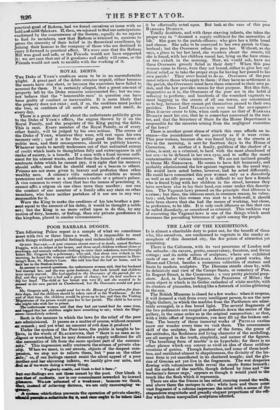ROYAL DEBTS.
line Duke of YORK'S creditors seem to be in an uncomfortable plight. A great part of the debts remains unpaid, either because the assets have run short, or because the executors have failed to account for them. It is certainly alleged, that a great amount of property left by the Duke remains unaccounted for; but we can- not believe that the "honourable men" in question can have been guilty of conduct so inexcusable. It is more likely that the property does not exist; and, if so, the creditors must pocket the less, as creditors of all sorts of men, great and small, do
• every day. There is a great deal said about the unfbrtunate publicity given to the Duke of YORK'S affairs, the stigma thrown by it on the
• Royal Family, and the propriety of the King paying the debts. This is cant. Every member of the Royal Family, as of every other family, will be judged by his own actions. The errors of the Duke of YORK, whatever they were, will rest upon his own memory only ; and it is for the public good that the errors of public men, and their consequences, should be publicly known. - Whatever tends to terrify tradesmen out of that unlimited extent of credit which leads to thoughtless folly and extravagance in all 'ranks of society, is a benefit. If a man with a fixed income suffi- cient for his utmost wants, and free from the hazards of commerce, • contracts debts which he cannot pay, it is right that his memory should suffer, and that he should stand as a beacon to others. Princes are not more given to luxury and profusion • than other - wealthy men. A citizen's villa sometimes exhibits as much pretension and waste as a nobleman's castle or a prince's palace. A vice common to every class that has the means of practising it, cannot affix a stigma on one class more than another; nor can the conduct of one member of a family affix any stain on other
• members, who have neither partaken of it nor are in any way • responsible for it.
Were the King to make the creditors of his late brother a pre- sent equal to the amount of his debts, it would be thought a noble
• act; but the King is no more called upon to do this, by any motive of duty, honour, or feeling, than any private gentleman in the kingdom, placed in similar circumstances.


























 Previous page
Previous page